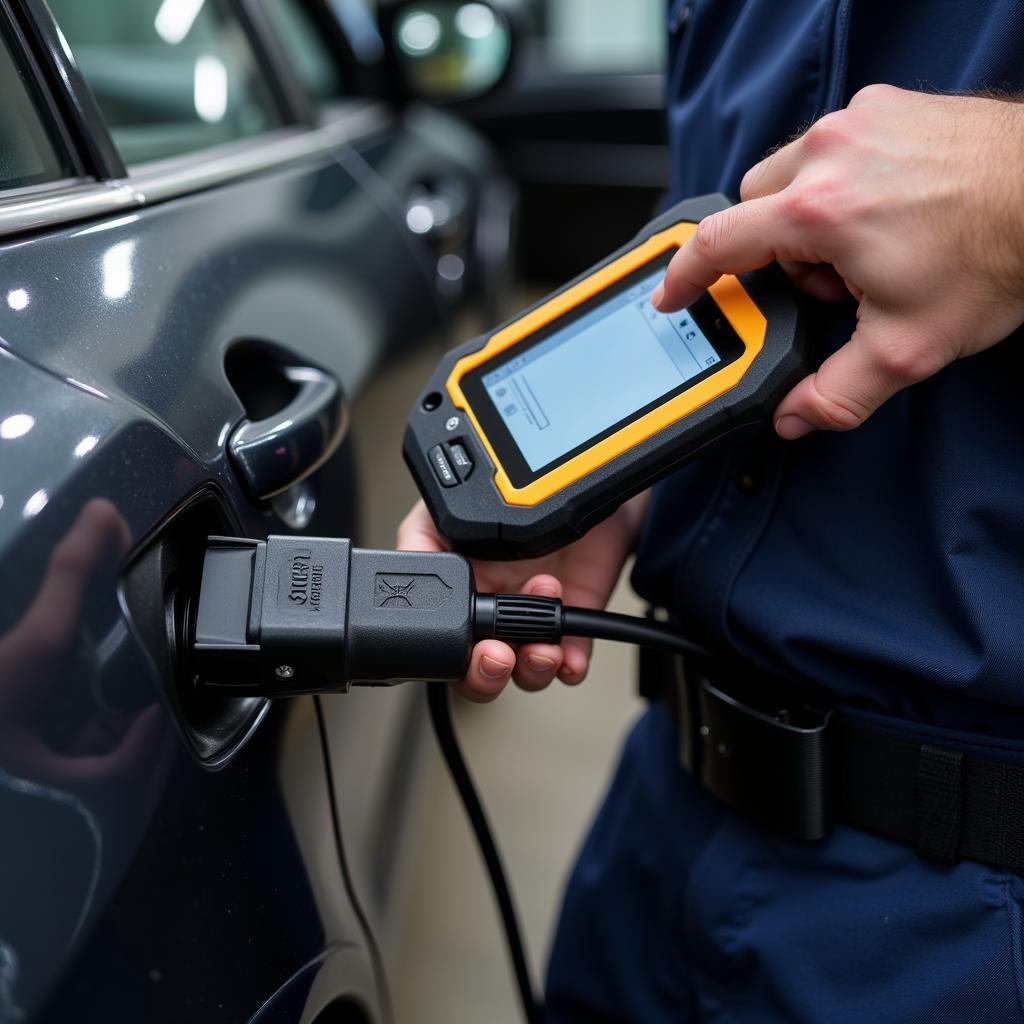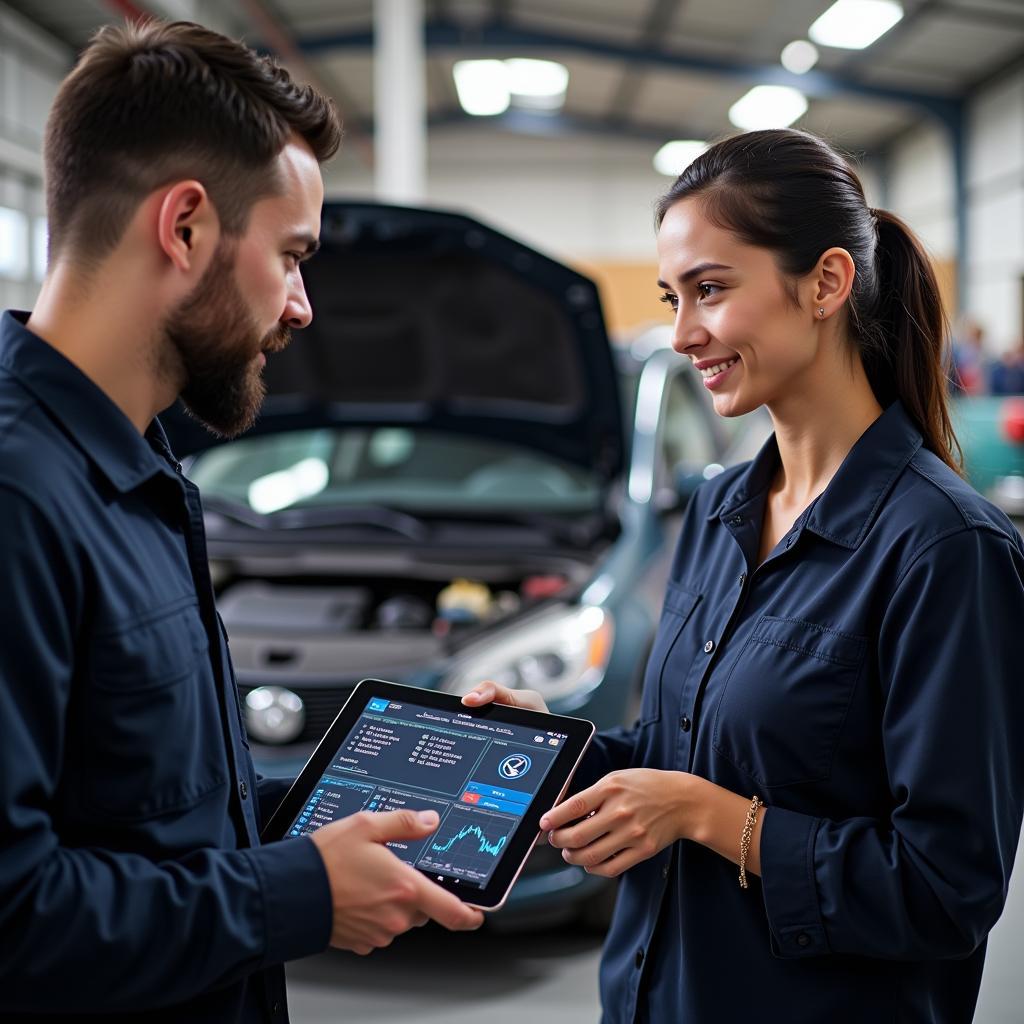Finding a trustworthy mechanic to diagnose your car troubles can feel like searching for a needle in a haystack. You type “Who Does Car Diagnostics Near Me” into Google, and you’re bombarded with a list of options, each promising to be the best. But how do you know who to trust with your precious vehicle?
Understanding the Importance of Accurate Car Diagnostics
Before we dive into finding a reliable mechanic near you, let’s understand why accurate car diagnostics are crucial. Your car, a complex machine, relies on various systems working in harmony. When a problem arises, it often triggers a warning light on your dashboard. This is where car diagnostics come in.
Think of car diagnostics as a doctor’s visit for your car. Instead of a stethoscope, mechanics use advanced scanners to communicate with your car’s computer system, reading fault codes and analyzing data to pinpoint the root cause of the problem. Accurate diagnostics are essential for:
- Effective Repairs: Throwing parts at a problem without proper diagnostics is like playing darts blindfolded. Accurate diagnostics ensure the right repairs are made, saving you time, money, and potential future headaches.
- Preventing Further Damage: Ignoring a minor issue can lead to major damage down the line. Early and accurate diagnostics help address problems before they escalate.
- Ensuring Safety: Some car problems can compromise your safety on the road. Accurate diagnostics help identify and address these issues promptly, keeping you and your passengers safe.
 Mechanic Using a Car Diagnostic Scan Tool
Mechanic Using a Car Diagnostic Scan Tool
What to Look for in a Car Diagnostic Service
Now that you understand the importance of accurate diagnostics, let’s explore what to consider when choosing a car diagnostic service:
1. Expertise and Experience:
Just like you wouldn’t want an inexperienced doctor treating you, you want a mechanic with the right expertise for your car. Look for:
- ASE Certification: The National Institute for Automotive Service Excellence (ASE) certifies mechanics in various automotive specialties. Look for ASE-certified technicians, especially those specializing in your car’s make and model.
- Experience with Your Car’s Make and Model: Some mechanics specialize in specific makes and models, giving them in-depth knowledge of common issues and repair procedures.
- Up-to-Date Technology: The automotive industry is constantly evolving. Choose a mechanic who invests in the latest diagnostic equipment and software to ensure accurate and efficient diagnostics.
2. Transparency and Communication:
A trustworthy mechanic will explain the diagnostic process, the findings, and the recommended repairs in a clear and understandable way. They should:
- Provide a Detailed Report: Ask for a written report outlining the diagnostic codes, their meaning, and the recommended course of action.
- Explain the Repair Options: A good mechanic will discuss various repair options, including the pros and cons of each, and help you make an informed decision.
- Answer Your Questions Patiently: Don’t hesitate to ask questions and clarify any doubts. A trustworthy mechanic will welcome your inquiries and address them patiently.
3. Reviews and Reputation:
In the age of the internet, online reviews can be a valuable resource. Check out reviews on platforms like Google My Business, Yelp, and automotive forums to get insights from other customers.
- Look for Consistent Positive Reviews: While a few negative reviews are normal, consistently positive reviews indicate a pattern of customer satisfaction.
- Pay Attention to Specific Feedback: Look for reviews that mention car diagnostics, the mechanic’s communication style, and the overall experience.
Where to Find Car Diagnostic Services Near You
Now that you know what to look for, let’s explore where to find reputable car diagnostic services:
- Dealerships: Dealerships employ factory-trained technicians who specialize in your car’s make. However, dealerships can be more expensive than independent shops.
- Independent Mechanics: Independent mechanics often offer more personalized service and competitive pricing. Look for ASE-certified mechanics with a strong reputation.
- Auto Repair Chains: National chains like Midas, Meineke, and Firestone offer a range of services, including car diagnostics. Check their reputation and compare pricing.
 Mechanic Explaining Diagnostic Results to Car Owner
Mechanic Explaining Diagnostic Results to Car Owner
Tips for Getting the Most Out of Your Car Diagnostic Experience
- Be Prepared to Describe the Problem: The more information you can provide about the symptoms, the better equipped the mechanic will be to diagnose the issue.
- Ask About Diagnostic Fees: Some shops charge a separate fee for diagnostics, while others waive it if you get the repairs done there.
- Get a Second Opinion: If you’re unsure about a diagnosis or the recommended repairs, don’t hesitate to get a second opinion from another reputable mechanic.
Conclusion
Finding a trustworthy mechanic to perform car diagnostics doesn’t have to be a daunting task. By understanding what to look for, where to find reputable services, and how to be an informed customer, you can ensure your car receives the care it deserves. Remember, accurate car diagnostics are an investment in your vehicle’s health, your safety, and your peace of mind.
FAQs
1. How much does car diagnostics cost?
Car diagnostic costs vary depending on the complexity of the issue and the shop’s hourly rates. On average, expect to pay between $80 and $150 for diagnostics.
2. Can I do car diagnostics myself?
While basic OBD-II scanners are available for purchase, they may not provide the same level of detail as professional-grade equipment. For accurate diagnostics and interpretations, it’s best to consult a qualified mechanic.
3. How often should I get my car diagnosed?
It’s a good idea to get your car diagnosed annually or if you notice any unusual warning lights or symptoms.
4. What is the OBD-II port?
The OBD-II port, usually located under the dashboard on the driver’s side, is a standardized connection point used for car diagnostics.
5. What are some common car diagnostic codes?
Common codes include P0420 (catalytic converter efficiency below threshold), P0300 (random/multiple cylinder misfire detected), and P0171 (system too lean (bank 1)).
Do you have any other questions?
Need help finding the diagnostic plug on a specific car model? Curious about who manufactures a certain diagnostic tool?
Learn more about who manufactures launch x431 pros mini car diagnostic tool and where is the diagnostic plug on a smart car.
For further assistance and expert advice, contact our 24/7 support team via WhatsApp: +1(641)206-8880 or Email: [email protected]. We’re here to help you navigate the world of car diagnostics and get you back on the road with confidence!

Leave a Reply